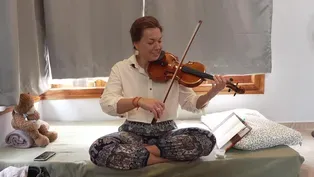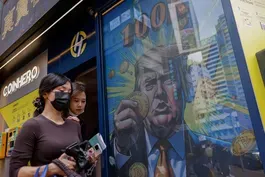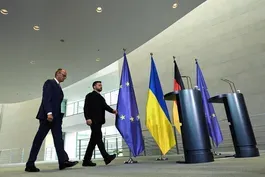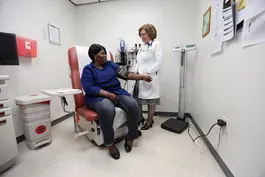
Why the U.S. is pausing all student visa interviews
Clip: 5/28/2025 | 9m 34sVideo has Closed Captions
Why the U.S. is pausing all student visa interviews
The U.S. is pausing new student and exchange visitor visa interviews while it looks to expand screening of applicants' social media posts, according to a State Department cable obtained by the News Hour. It's part of a crackdown on immigration and higher education by the Trump administration. Amna Nawaz has views on the effort from Simon Hankinson of the Heritage Foundation and Fanta Aw of NAFSA.
Problems with Closed Captions? Closed Captioning Feedback
Problems with Closed Captions? Closed Captioning Feedback
Major corporate funding for the PBS News Hour is provided by BDO, BNSF, Consumer Cellular, American Cruise Lines, and Raymond James. Funding for the PBS NewsHour Weekend is provided by...

Why the U.S. is pausing all student visa interviews
Clip: 5/28/2025 | 9m 34sVideo has Closed Captions
The U.S. is pausing new student and exchange visitor visa interviews while it looks to expand screening of applicants' social media posts, according to a State Department cable obtained by the News Hour. It's part of a crackdown on immigration and higher education by the Trump administration. Amna Nawaz has views on the effort from Simon Hankinson of the Heritage Foundation and Fanta Aw of NAFSA.
Problems with Closed Captions? Closed Captioning Feedback
How to Watch PBS News Hour
PBS News Hour is available to stream on pbs.org and the free PBS App, available on iPhone, Apple TV, Android TV, Android smartphones, Amazon Fire TV, Amazon Fire Tablet, Roku, Samsung Smart TV, and Vizio.
Providing Support for PBS.org
Learn Moreabout PBS online sponsorshipAMNA NAWAZ: The United States is pausing all new student and exchange visitor visa interviews, which covers a broad swathe of professions, from doctors to camp counselors, while it studies how to expand screening of applicants' social media posts, according to a State Department cable obtained by the "News Hour" and signed by Secretary of State Marco Rubio.
This comes as part of a broader crackdown on immigration and higher education by the Trump administration.
And the larger battles with the administration have been the focus of our series this month on Rethinking College.
Joining us now to discuss the latest is Simon Hankinson, who had a 23-year career in the State Department and is now at The Heritage Foundation, and Fanta Aw, CEO of NAFSA.
That's the association of international educators.
Welcome to you both.
Fanta, just kick us off here.
For context, is there precedent for this kind of pause on all new visa interviews in these categories?
And how different is this from what we saw during COVID, for example, or during the first Trump administration?
FANTA AW, CEO, NAFSA: No, I think there's not any precedents that I can recall in having worked in this field for over 35 years.
I think, during the COVID period, we understood because of COVID and because of mobility and health issues and all of that, there were certainly complex issues that made travel very difficult during that period of time.
And so this is really, I think, in some way, on some level unprecedented, in that the focus is specifically on international students in F, J and M is definitely the part that is very much unprecedented.
AMNA NAWAZ: And those are, again, the types of different visa categories, F,J and M, as you mentioned there.
Simon, there are already, as you know, a number of reasons people are ineligible for these kinds of visas.
That's supporting terrorism or having a criminal record.
What would this level of screening catch that previous screening didn't already?
SIMON HANKINSON, The Heritage Foundation: Well, when I started doing visas in India in 2000, it was a half-sheet of paper front and back with a bit of information it in pen.
And then, over the years, we had 9/11.
All the attackers were admitted under non-immigrant visas.
We asked for more information.
It got more complicated.
Now it's online.
So this is the next logical step.
We have tools now that can search enormous volumes of information very, very quickly.
And if they're adding social media and other profiles to the application form, then presumably this is the next logical step in screening.
AMNA NAWAZ: And logical how?
I mean, given your experience too, is it possible to screen through everyone's social media posts going back in time?
SIMON HANKINSON: Well, it's not possible to search absolutely every single item of information about every single human being, particularly if they don't give you those handles and the information that you need.
But, yes, I think, these days, particularly with -- we have all seen ChatGPT and these other A.I.-powered search engines that can go through just tons of information incredibly quickly.
So we have these tools, and I think it's probably a good idea to use them so that we know as much as possible about anyone that we admit into this country, particularly students who are going to be here for a long time.
AMNA NAWAZ: So, Fanta, to that point, the cable from Secretary Rubio that went to the U.S. consulates and embassies alluded to executive orders that were aimed at keeping out terrorists, battling antisemitism.
Shouldn't the administration, to Simon's point, be able to screen for language or a post that it considers either dangerous or potentially dangerous from people coming to the U.S.?
FANTA AW: Well, I think we should all take national security seriously.
And so we do understand that.
But I think the bigger question is, why international students specifically, right?
As was pointed out with 9/11, and non-immigrants, but non-immigrants, it wasn't only -- it wasn't F-1 students.
We had people on tourist visas.
And so this idea that the sole focus is on students, who, by the way, make up less than 6 percent of total enrollment in U.S. universities, and if, in fact, the point here is national security and safety, I really -- I think we felt to understand why the focus is specifically and solely on students.
AMNA NAWAZ: Simon, what would you say to that?
Why this focus?
SIMON HANKINSON: Well, it may be 6 percent across the country, but, in Columbia, it's over 50 percent.
At NYU, it's over 50 percent.
And where was all of the worst violence and antisemitism and the most violent protests and takeovers of buildings?
It was Columbia.
It was Harvard.
It was these schools with very high percentage of foreign students.
And, overall, these people are coming for a long period of time.
Unlike a tourist who's going to Disneyland or New York City for a couple of weeks, a student could be here four years, six years, and in many cases, they remain and become legal permanent residents and citizens.
And if someone is posting antisemitic, anti-capitalist, anti-American, or violent content on their social media, I don't think they're going to make a good tourist or a good student and certainly not a good American.
AMNA NAWAZ: Fanta, to Simon's point, many of these students who come -- and it's not just students, we should mention, as we mentioned earlier, doctors, camp counselors.
Have you looked at the broader economic implications in terms of the ripple effects of this population not being able to come to the United States?
FANTA AW: Well, we certainly have.
We provide every year data on international students and the economic value of international students.
And the latest data that we produce shows that they basically contribute close to $44 billion, and that translates into over 330,000 jobs.
So the economic impact is not only to the universities, but in fact to the local economy and to the economy overall of this country.
And the other piece that I did want to also address is this idea that, yes, students are here for a longer period of time, but non-immigrant students are the most tracked of any other category of non-immigrants.
The international -- the student exchange visitor information system was created to track international students.
So, the government knows where they're studying.
The government knows.
Every semester, every quarter universities are required to update the system indicating that they're bona fide students.
They have their addresses and all of those information.
No other non-immigrant has a tracking system the way international students do.
So, in addition to the economic contributions that we have talked about to the economy and to the institution, we also have the fact that these are the most tracked of any non-immigrant students.
AMNA NAWAZ: Simon, what's your response to that,the idea that these are already people who are tracked within the system, who have to register wherever they go?
And, also, is that economic cost that Fanta mentioned there, is that worth it?
SIMON HANKINSON: They're two completely separate arguments.
They're not particularly well tracked, and when they do fall off the system, nobody does anything.
We have people in this country, 1.2 million people who have final deportation orders who have not left.
We have students who've quit school, gotten jobs, and nobody's following up.
Hopefully, they will soon.
And I think it's kind of jumping ahead a bit here to assume that, all of a sudden, they're not going to issue any student visas.
This is a leaked cable that describes a change in processing.
I think it's an improvement, and my expectation is that they will improve the efficiency, as well as the transparency of the process, and continue to adjudicate half-a million student visas a year, including au pairs and professors and all the rest of the good categories, while filtering out a few of the bad apples that they will be able to find.
AMNA NAWAZ: Fanta, separate from the economic argument, you have also said you have concerned about what this means for the diversity of viewpoints on university campuses, and what this means reputationally for higher ed in America.
FANTA AW: Well, I think, again, one of the strengths of this country and what has drawn international students to this country is really the strength of its academic program and world-class education that students are able to receive in this country.
And so I agree that this is a pause, but we also know with a pause, when you then add that to the other actions that have been taken over the last several months, and given the data that we have analyzed, we already saw with this spring a 43 percent decline in interest in the United States.
This is high-stake for students and their families.
And so they will seek other destinations as a result of that.
And so we do have to take into account, yes, it is a pause, but I think along with the pause is, what's the message that's being sent?
Additionally, U.S. consulates, as we know, are always strapped when it comes to capacity.
We see in several countries the wait time for visas are long in some countries where there's been an increase in students.
So, yes, we really hope that the pause will be lifted and that it will be streamlined, but also we know that,from precedents, the embassies are already strapped when it comes to their ability to issue visas on time.
AMNA NAWAZ: Simon, I will give you the last word here.
Does this send a chilling message?
Does the U.S. stand to lose international talent?
SIMON HANKINSON: I have heard that panic button pushed for 25 years.
And, look, the message should be, come to America, we want you and study.
Don't spend your time on the campus wearing a keffiyeh and burning American flags and telling us how to run our foreign policy and how much you hate capitalism.
Do your job of being a student, and we welcome you.
I think, if viewpoint diversity is lacking on the campus of Columbia and Harvard, it's probably not the left-wing viewpoint.
AMNA NAWAZ: Simon Hankinson and Fanta Aw, I thank you both for your time.
Really appreciate it.
SIMON HANKINSON: Thank you.
American violinist explores Carnatic music in India
Video has Closed Captions
Clip: 5/28/2025 | 7m 20s | American violinist Ariana Kim visits India to explore Carnatic music (7m 20s)
As dollar takes a hit, Trump family invests heavily in crypto
Video has Closed Captions
Clip: 5/28/2025 | 5m 22s | As dollar takes a hit, Trump family invests heavily in crypto (5m 22s)
News Wrap: Germany to help Ukraine build missile system
Video has Closed Captions
Clip: 5/28/2025 | 7m 30s | News Wrap: Germany's chancellor offers to help Ukraine build long-range missile systems (7m 30s)
The potential impact of Medicaid cuts in Trump's budget bill
Video has Closed Captions
Clip: 5/28/2025 | 6m 8s | Exploring the potential impact of Medicaid cuts in Trump's big budget bill (6m 8s)
Three Mile Island gets new chance to become energy hub
Video has Closed Captions
Clip: 5/28/2025 | 8m 57s | Site of America's worst nuclear accident gets new chance to become energy hub (8m 57s)
Why health groups are concerned about COVID vaccine changes
Video has Closed Captions
Clip: 5/28/2025 | 7m 20s | Why public health groups are concerned about changes to COVID vaccine recommendations (7m 20s)
Providing Support for PBS.org
Learn Moreabout PBS online sponsorshipSupport for PBS provided by:
Major corporate funding for the PBS News Hour is provided by BDO, BNSF, Consumer Cellular, American Cruise Lines, and Raymond James. Funding for the PBS NewsHour Weekend is provided by...

















